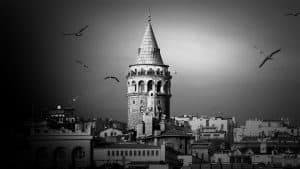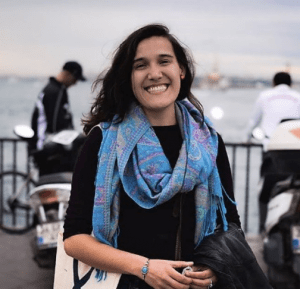A Story of Two Syrian Refugees, United & Divided by Political Forces
On the night of August 13, 2015, two young Syrian men were preparing to set out toward Greece from the Turkish coast. Hiding behind bushes on the shores of the Turkish village of Bodrum, each man made a monumental choice. Bashar, aged twenty-four, decided to turn back toward Istanbul, while Basel, aged twenty-six, decided to continue onward to Germany.
Bashar and Basel had met the way most Syrians in Turkey do: through friends of friends. A desire to seek asylum in Europe had brought Bashar to the coastal town of Izmir. The days prior to their departure were tense and slow. At sunset, the two men began their journey into the woods of Bodrum with four companions. They met their smugglers’ middlemen, along with dozens of refugees and migrants, and waited silently for directions. Their goal was to reach Bodrum where the smugglers would be waiting with inflatable boats.
The middlemen crammed them into taxis and they headed off toward Bodrum. Once they reached the village, the middlemen ordered them to get out and run without looking back. Chaos ensued as women, men, and children ran blindly into the night. When the crowd settled, Basel suggested they form a line to create some kind of order. After hours of walking, Bashar took in the terrain. “Greece was so close. I could see it,” he recalls. “It was so close I could swim to Greece.”
As they neared the coast, they discovered the Turkish coastguard waiting for them with flashlights. The blinding light caused them to scatter for hiding places. “I ran really fast until I couldn’t feel my legs,” Basel explained. “We were really afraid and thinking of heading back because we didn’t even have life jackets.” Ultimately, Bashar decided to stay in Turkey and watched as Basel and the rest of the refugees continued further. “I was not thinking with my head, I was just feeling,” he says. Displaced from their homes and living thousands of miles apart, Bashar and Basel’s stories have intersected and diverged in unpredictable ways since that night in Bodrum.
“I ran really fast until I couldn’t feel my legs,” Basel explained. “We were really afraid and thinking of heading back because we didn’t even have life jackets.” Ultimately, Bashar decided to stay in Turkey and watched as Basel and the rest of the refugees continued further. “I was not thinking with my head, I was just feeling,” he says. Displaced from their homes and living thousands of miles apart, Bashar and Basel’s stories have intersected and diverged in unpredictable ways since that night in Bodrum.
Life in Istanbul
“I don’t know my days from my nights,” Bashar says, as he make his way down Istanbul’s bustling streets. Bashar is 6 feet, 4 inches tall with wild curls that make him look even taller and sharply contrast with his low spirits. “There is no solid ground for me to stand on,” he explains to me in October 2015 over tea at Tutuncu. Tutuncu is a tobacco shop frequented by Syrian musicians in Istanbul and a place where Bashar spends most of his free time.
There are 2.2 million Syrian refugees in Turkey, with some 200,000 living in refugee camps; the rest are urban refugees. Bashar is among those refugees living outside the camps. More than two months since returning from Bodrum, he is still couch surfing.
He has his share of good days and bad. “I’m an open book,” he jokes with a smile, parting his hair though the middle and pretending to flip the pages of a book; today is a good day.  Bashar is a prolific classical guitar player, having mastered tunes like “Taranta” from Spanish composer Paco de Lucia. When he left Syria, Bashar carried nothing more than a suitcase and his guitar, which he play in the streets and with his band. “Playing helps me surrender easily to reality,” he says. Street performances earn him and other Syrian musicians a few liras, but nothing close to covering rent or achieving financial stability.
Bashar is a prolific classical guitar player, having mastered tunes like “Taranta” from Spanish composer Paco de Lucia. When he left Syria, Bashar carried nothing more than a suitcase and his guitar, which he play in the streets and with his band. “Playing helps me surrender easily to reality,” he says. Street performances earn him and other Syrian musicians a few liras, but nothing close to covering rent or achieving financial stability.
Bashar left his home in the Syrian port city of Latakia, a stronghold of President Bashar al-Assad, on December 25, 2014. With his university graduation looming, Bashar was already being sought out for military service by the Syrian army. Instead of waiting for the inevitable, Bashar left before graduating.
Still young, Bashar is eager to continue his education, despite the high tuition costs in Turkey. “I don’t want to be uneducated,” he says. Ultimately, however, Bashar wishes to return home to Latakia. “My family tells me that I’m lucky to be here, but they don´t know what I´m suffering,” he confides.
Life in Turkey has been challenging for Bashar, who suffers from a heart condition he cannot afford to treat. His family is no stranger to illness. Bashar’s parents were diagnosed with cancer in 2012, and he became their caretaker while he was still in high school. “I haven’t felt safe in Turkey because of my health situation,” he says. “When I was with my mom and I felt tired, she made me feel calm.”
In Tutuncu, Bashar and his friends roll cigarettes and exchange jokes as they prepare to perform in one of the city’s busiest streets. “All you see are tourists and you see them having fun, enjoying their time,” Bashar muses, before striking a wistful tune on his acoustic guitar. “It´s hard.”
“I left Istanbul [for Izmir] with all my friends and came back with no one,” Bashar says. “I was alone.” Bashar does not, however, regret his decision to remain in Turkey. “I tell my friends not to go to Europe; it’s so humiliating,” he says over his third cup of tea, loaded with three sugar cubes. The lack of safe passage to Europe, coupled with the recent EU-Turkish refugee deal, has deepened the humanitarian crisis along the Turkish border, which is now closed off to Syrians. On March 3, Turkey received the first wave of deportations from Greece in the town of Dikili, on the western Turkish coast.
“We are facing death to go to Europe and paying a lot of money to ask the German government to give us money. It’s so degrading,” Bashar says. While his feelings about Europe appear to be partially rooted in his two failed attempts to cross the Aegean, they are mostly grounded in a persistent desire to return home. “I don’t think about the war. Syria, for me, is my family,” he insists, firmly. “My goal is to go back.”
Life in Mannheim, Germany
Some 1,450 miles from Istanbul, Basel recalls the reasons why he came to Germany, as we sit in a café in Mannheim in October 2015. “I like to do things my way.” He maps out the twenty-five-day odyssey from Bodrum to Germany, using cups and spoons he has collected from the table.
Originally from Damascus, Basel displays the confidence and incisive pragmatism of a senior businessman. “It’s not business if you don’t take risks,” he says of the perilous journey to Europe. It is a mantra that may have worked for him, but has not turned out so well for the thousands of refugees and migrants who have drowned at sea.
“Convincing Bashar to come with us was impossible,” Basel recalls. Basel had decided to pursue a better life in Europe almost on a whim. He had been living in Turkey for three and a half years with his family. The idea of Europe had, however, lingered in the back of his head; he had always dreamt of studying in Germany.
Like Bashar, Basel is the youngest member of his family. He was only willing to make the journey to Europe if his mother consented to the trip. Once she did, it was not long before Basel found himself in Bodrum.
In Bodrum, Basel and his friends had to wait an entire day before departing under the scorching sun; they pretended to be tourists whenever the coastguard passed by. At nightfall, the smugglers returned and picked them up. To help pay for his trip, Basel volunteered to drive the rubber dinghy to Kos, becoming the de facto leader of his group. Using his English-language skills and talent for sweet-talking, Basel negotiated for his group’s passage through Serbia into Hungary with the “Serbian mafia,” as he calls the network of human traffickers that facilitated their journey.
While Basel believes doing things his way is usually the best, his journey has taught him that brazen decisiveness cannot erase the severe conditions marking the Syrian exodus to Europe. “I thought it would be easier, but I don’t regret coming to Germany,” he says. “It just makes the challenge harder.” His voice fills with anger as he recalls how the Hungarian “confiscated” a silver coated lighter, an heirloom from his father. “Hungarian authorities were stealing from refugees,” he says angrily.
“I have a seven-year plan,” Basel says calmly, as though he is talking about days instead of years. He plans to finish his undergraduate degree, obtain a master’s degree, and land a high-paying job. “Germany is fertile,” he adds, pointing to several business ventures that could flourish in any part of downtown Mannheim. “But you can’t call this an opportunity,” he stresses, acknowledging the conflicting reality of being a Syrian refugee in Europe. “We have lost everything and it’s not about ‘opportunities’ for people who have lost everything,” he says. After a moment of silence and a few cigarette-puffs he adds, with characteristic shrewdness, “I lost my country but I’m not dead.”
While German bureaucracy can make life difficult, Basel is certain Germany is the right place to get an education and fulfill his dream of owning a stock brokerage company. All he asks of the German people is “to accept us [refugees] as normal people that come here to work and study.”
Eight months after our first meeting in Germany, I speak to Basel again on the phone in March 2016. His dry sense of humor seems to mirror his failed expectations. Almost every other word that comes out of his mouth is a curse word, less a product of anger than bluntness. Basel tells me he was transferred out of the refugee camp, where he had been staying, and sent to a former mental institution that houses about 100 refugees in the city of Nagold.
Since he first arrived in Germany, Basel has caught pneumonia, been hospitalized, and started a German-language course. He is still waiting for his residency interview with German immigration authorities. A monthly €350 stipend from the government allows him to pay for food, but little else.
The friends Basel made, who were a source of solace on his journey to Europe, were all sent to different villages. “I got my transfer alone,” Basel tells me. “They sent everyone to a small village and no one stays with his friends. You feel lonely without friends, family, without anyone that you care about, trying to survive.”
“Why am doing all this alone somewhere?” he asks himself. “Let me go back to my family, even if I must have a bad life, it is better than being abroad alone.” But, it is not all bad. “At least I don’t cry alone at night,” he jokes.
Basel will wait, just as he has done these last six months. He will wait for the necessary appointments; wait for his life to begin in Germany. His recovery from pneumonia, a celebratory bag of chips, and more cursing in German seem to lift his spirits. He ends our conversation with the German word for goodbye, “tschüss” – a symbol of his new life in a new country.
Forging Separate Paths

